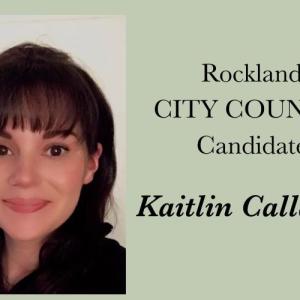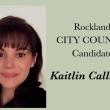On the issues: Rockland City Council Candidate Kaitlin Callahan
Four candidates are competing for two open seats on the Rockland City Council, with elections set for Nov. 7. Both seats represent three-year terms. Those running for office are Adam Ackor, Nathan Davis, Kaitlin Callahan and Louise MacLellan.
Penobscot Bay Pilot has posed questions to each candidate, providing the opportunity for the public to better understand their positions on issues. Here, candidate Kaitlin Callahan responds:
Please provide a concise biography of yourself
Born in Maine, I have spent most my life in the Midcoast and moved to Rockland when I married my husband, six years ago.
A local school teacher, my husband and his family have lived on Willow Street for almost three-quarters of a century. I am a mom of two, a toddler, as well as a son who will turn 21 this year!
For most of my professional career, I have cared for people—20 years in healthcare with a focus on Alzheimer’s and dementia for about a decade and then in hospice and now as part of a substance use treatment team.
I am also committed to volunteering and advocating for issues locally.
I am passionate about seeing Rockland flourish and have developed a reputation for being an incessant bulldog when it comes to getting things done. I am incredibly focused on making impactful change and doing it in an effective manner.
What are Rockland’s greatest strengths, and how do you hope to support them?
Rockland has many strengths that make it a unique and vibrant place to live and work. Just to name a few: Rockland is a naturally beautiful city, we have a rich history tied to fishing and maritime industries, there is a vibrant and growing arts, food and cultural scene, our location and local offerings make us a tourist destination, and we have diverse and talented residents.
To support these strengths, the city, community organizations, and residents need to work together to identify specific needs, allocate resources and find non taxpayer funded revenue, and implement initiatives that foster economic, cultural, and environmental sustainability.
Collaboration with stakeholders and executing the new comprehensive plan will help Rockland begin to thrive again, while preserving its unique character and strengths and once again become a city people can afford to live in and work in.
What are Rockland Maine's greatest issues to address?
Rockland is facing some big challenges ahead. We will need to work together toward the big picture, to start and turn things around.
I’d say currently our greatest issues are: a lack of affordable housing and unstable rents, the drug epidemic, a worker shortage, lack of new development of both commercial and residential infrastructure, and high property taxes.
We need to source new streams of revenue that do not come from taxpayers and we need to be lobbying the state for changes so that we can better support our community. I will address these topics further in my following answers.
Rockland, the region, state and country remain locked in an opioid crisis. While the state has taken a leadership position in responding (see Maine Opioid Response) to the crisis, how would you, as a City Council member, work to build a healthier community?
For any City Council member in Rockland, it is essential to play an active role in addressing the ongoing opioid crisis and working towards building a healthier community.
I believe that, out of all the candidates, as well as current Council members, I am uniquely qualified to lead the charge in addressing this crisis by using some of the most effective, evidence-based and innovative strategies, and taking full advantage of the resources we already have but are not using to their full potential.
I am also already connected and embedded in recovery communities, recovery-based organizations and efforts locally, regionally and statewide.
Rockland actually already has a very knowledgeable, motivated and diverse collection of collaboratives, nonprofits, community stakeholder and lived experiences groups that are actively focused on increasing treatment access and recovery services in Rockland and across Knox County.
I have had the pleasure of working with the majority of them over the years. Some of the problems we encounter over and over are: awareness and stigma.
We need to reduce stigma. From providers, to nonprofits, to the sheriff's department and RPD, we can only reach a certain segment of the community.
Part of the challenge is the stigma that comes along with Substance Use Disorder and/or the mental health challenges that may accompany it.
In the past, and still to this day, stigma continues to prevent many people from seeking resources and/or treatment, including just basic medical treatment aside from their addiction.
And we need to work on awareness. The City could and should be a great amplifier for these spaces and resources that are available now.
Many of the meetings happening among organizations working on these issues are already open to the public and welcome all community voices, especially those of the folks with lived experience.
I want to see the city host regular listening sessions so an open, honest and on the record dialog can be established between community members, resource providers, and the city.
We need to stop addressing addiction and substance use disorder in the quiet, hidden corners of our community. Support is one of the absolute must-haves for someone to achieve and maintain long term recovery and people do not seek support in places they feel shamed and stigmatized in.
Working with local schools to expand universal awareness, educational, and resource training in the past has been difficult, but we made big progress last year and more this year.
Breaking the cycle of generational trauma that often leads to addiction has to start NOW and with US.
Breaking down the stigma and having a space that creates a non-judgemental, non-punitive, safe environment for our youth to have an ongoing open dialog with supporters like The Landing Place and the Statewide Youth Peer Network is absolutely crucial.
Lastly many events are held on Main Street that draw big crowds, locals and folks from away, alike. These bring in additional revenue to Main Street; why can't they bring in donations for a local project, too?
Why can’t we do something that draws a big crowd for recovery?
An example could look like, “A day on the Streets of Rockland.” A day-long event that includes community education of addiction, promotes family togetherness and fun, supports local business on Main Street by drawing a crowd to shops and restaurants, then ends with something like a ‘Recovery Resources, Art Walk fundraiser.’ A collaboration between the many galleries we have here, local/Maine artists touched by addiction and then mix in a bit of a Harm Redux education, resource and provider awareness/fair and we’d have a great event that supports the community in its recovery while also offering some of the best things Rockland/Maine has to offer; art, food, connections, and shopping.
What a great way to kick off recovery month in September while enjoying the last long weekend of the summer, Labor Day.
At the end of the day, having a community response is the only chance we have. No one is coming to save us.
If the community as a whole doesnt get invested together, we will continue as we are if not worse. I could go on and on on this topic so I'll just say; in the recovery community the words, “The opposite of addiction is not sobriety. It is human connection,” are quoted regularly, because ultimately nothing is truer.
Johann Hari really summed it up well during a TED Talk when he said, “When the [person] finds that they are not alone and no longer have to fight their dependence on their own, their lives become open to a world of possibilities. Most importantly, they are encouraged by the support that they receive from others that are also in recovery. They are experiencing the personal connection that gives them the necessary support and accountability essential to growing in their recovery. No longer does addiction have to be linked in an unbreakable chain.”
I see this truth regularly in small pockets of the community. We are making headway, but as just several small groups spread across the county, with almost not platform we are fighting to just tread water. Imagine if those small pockets of focus turned into an entire community, the impact it would have.
Rockland’s Police Dept., as well as Fire and EMS, face a constant barrage of overdoses and mental health crises in their line of work. How will you support them?
Supporting RPD, RFD and Rockland EMS services in addressing overdoses and mental health crises is crucial for the safety and well-being of both them and the community. I think I am probably particularly sensitive to this aspect of the job our first responders face. I know first-hand what it is like and the toll it takes, working in constant crisis mode, to bear witness to the trauma of our neighbors, day in and day out.
The biggest thing I would like to recommend here is resources and support. I would like to see a shift in how we respond to emergencies and explore recommendations made by the Police Committee – to invest in a mental health and/or social work response.
There are amazing models that exist (like the CAHOOTS model – over 20 years old now) which would not only compliment our outstanding emergency response team – but help them stay focused on the most high-priority emergencies.
Above all, we need to ensure basing our policy on data and providing our emergency response team with the most up-to-date, evidenced based specialized training for first responders in techniques that would reduce the need to use de-escalation skills, by promoting things like non violent communication and trauma-informed approaches in first responder training and interactions with individuals in crisis.
Recognizing and addressing trauma can help build trust and improve outcome.This can help first responders to better handle mental health crises and reduce the potential for escalation. Which is safer and best for our community members and our first responders.
And for our first responders allocating resources to ensure that they also have access to mental health support services. This includes counseling, therapy, and peer support programs to help them cope with the emotional toll of their work. I think exploring establishing peer support networks within first responder agencies to provide emotional support and guidance to colleagues who may be experiencing stress or trauma is also prudent.
Lastly, I would prioritize continuing and supporting what Chief Tim Carroll has done to evaluate and reform policies related to drug offenses and mental health interventions.
This is something Chief Carroll has been doing since he was Sheriff and he has been doing it very well. He is incredibly dedicated to this work in our community and often says, “We can't arrest our way out of this,’ and he is right, we can't.
Continuing the shift towards a more compassionate and rehabilitative approach will continue to reduce the burden on first responders and our overburdened criminal justice system as well as lessening the continued hardships even one drug arrest can cause the already most vulnerable of our population as well as on the community and community resources.
A dearth of workforce housing is plaguing the region. What would you do to help encourage expansion of the housing stock for the middle and working classes? Should Rockland’s zoning ordinances support denser housing patterns and construction of accessory dwellings on smaller lots? Is there an ideal balance for regulating short term rentals and allowing property owners to earn money from short term rentals?
Addressing the dearth of workforce housing in Rockland requires a multi-faceted approach that balances the need for affordable housing with the interest of the community.
I believe we could immediately start addressing our current housing crisis by revising zoning ordinances to allow for denser housing patterns, like multi-family homes, townhouses, or apartment complexes.
We can also work to make it easier for residents to add accessory dwellings, like granny flats or in-law suits, in order to house family members and create new units, without changing the character of existing neighborhoods.
We should offer incentives for new residential development. This could include TIFs, density bonuses, or support in obtaining grant funding, to developers or homeowners who commit to building or maintaining affordable housing units.
Part of this effort should include collaboration with private developers and local nonprofits to create more mixed-income housing developments. Public-private partnerships can help leverage resources and expertise to address some of our housing challenges. Working to simplify and expedite the permitting process for affordable housing projects may also help to reduce the time and costs associated with development.
We also need to pass a rent stabilization policy. Not everyone feels good about this, and I understand the fear and stigma because everyone thinks of “rent control.”.
Rent stabilization is not rent control. Rent stabilization policy is a necessary response to our community which is in crisis, and an effective tool to provide immediate relief to that crisis. Rent stabilization is not punitive towards property owners. It simply provides some basic (and generally agreed on fair) protections for renters to ensure they aren’t unfairly forced out of their homes (for some, of many years) by unexpected or drastic increases in costs.
I am dedicated to working on a policy that still ensures landlords are covering their expenses and making a profit, while also protecting our community members who rent, from 38-50% rental increases with as little as a 31-day notice, forcing them out of their community and away from their support systems.
And lastly, I do believe we need to phase out NON-OWNER occupied short term rentals. This is the only 100% commercial use allowed in our residential neighborhoods that does not provide long term housing. It does not meet the defined goals of our zoning, regarding the purpose of residential neighborhoods. And under the old comprehensive plan, when the change was made, it was not legal per the requirement we protect residential neighborhoods from commercial use.
This is a purely commercial use that the Council should have never allowed happen in our residential neighborhoods. And now we have not only 40 or so properties being used as mini-hotels instead of housing – we also have a growing waitlist for more, with many properties on that waitlist currently providing long term housing that we will clearly lose if we lift the cap.
Some keep saying that STRs don’t affect the long term rental market. This simply is not true. Anyone who has lived here for any amount of time can look at the list of properties now non-owner occupied and see which used to be long term homes and housing.
And you only need a basic sense and understanding of economics to understand that if you allow investors to purchase homes as businesses, that use impacts the value of the housing and helps to drive prices up and lock average homeowners out of being able to purchase them.
Is phasing out non owner occupied SRTs going to solve our whole housing crisis? No, of course not. No one policy solution is. But it is one of the policy tools we can use to chip away at the loss of our current neighborhoods and housing and to stop the speculation and investor buy out of our local housing.
To be very clear – if you are a homeowner occupying your residence and want to use part of it for a short term rental to offset your income – I am absolutely in support of that!. But we don’t allow ANY other non-owner occupied business in residential neighborhoods and we shouldn’t make exceptions for short-term rentals.
There is likewise a rise in homelessness in Rockland. How best can the city help to mitigate and alleviate that trend?
Addressing the homelessness in Rockland requires a multifaceted approach that involves the city, nonprofits, businesses, and the community as a whole. It is crucial for Rockland to involve a diverse group of stakeholders and engage with the homeless population itself to understand their unique challenges and needs. This is a complex issue. A compassionate and collaborative approach is essential for making a lasting impact.
We should be expanding access using evidenced-based approaches in this process like prevention programs that aim to prevent folks from becoming unhoused by providing impactful financial assistance, offer a wide range of rent assistance and eviction prevention services to help folks stay housed, like mediation services to individuals and families at risk of losing their homes.
Rockland should explore how they can contribute towards a “Housing First” approach, which prioritizes getting people into stable housing as quickly as possible and then providing support services. (Both this and the above options can be completely grant funded. It happens in other Maine city’s now, like in York.)
This approach is backed by evidence and has been successful in reducing homelessness in many communities as well as helping those with SUD get into and stay in long term recovery. There is an overlap in how we address homelessness and the drug epidemic in Rockland and Knox County. We should use it to our advantage and continue to coordinate efforts and share resources so we can be as effective and efficient as possible in addressing the challenges facing our community.
By collaborating with local businesses, educational opportunities, and our career development programs, we can create job training and employment programs tailored to the needs of unhoused community members like trauma informed employment opportunities and local certified recovery friendly businesses.
At the same time, we can also do things to stem the loss of housing we are seeing contributing to homelessness. Myself and many others can tell you countless stories of the folks we are seeing, first hand – being forced out of their housing due to extreme rent spikes. With nowhere to go and the current housing crisis, it is not unheard of to see what you may think of as an average worker, retiree or senior go from having a roof over their head – to nowhere to go except for a tent.
We need to work on the root causes and solutions but we also need to provide more immediate policy solutions to help slow and calm these very acute issues.
What is your vision for Rockland Maine Harbor given the increased demand for real estate, and Maine’s longtime goal to protect the working waterfront?
Rockland, like many coastal communities, faces the challenge of preserving our working waterfront and addressing the need for continued development. The vision for Rockland’s harbor front involves a balanced approach that supports both economic development and preservation of the waterfront. . The new comprehensive plan offers the framework to do this and the Harbor Redesign plan really is a roadmap for achieving it. Both plans were put together with a great deal of community involvement, feedback and participation. I have been reading and studying both very closely for some time now and I believe we should be using these documents to guide us in this effort.
I’d focus on the execution of:
- Mixed-Use Development: Waterfront properties include a combination of residential, commercial, and industrial spaces. This can help maintain a vibrant working waterfront while also accommodating the need for housing and other amenities.
- Mixed-Use Development: Waterfront properties include a combination of residential, commercial, and industrial spaces. This can help maintain a vibrant working waterfront while also accommodating the need for housing and other amenities.
- Zoning and Regulation: Implementing zoning regulations and land-use policies that protect the working waterfront is crucial. This might involve designating specific areas as maritime or industrial zones to ensure that critical maritime activities are not displaced by real estate development.
- Zoning and Regulation: Implementing zoning regulations and land-use policies that protect the working waterfront is crucial. This might involve designating specific areas as maritime or industrial zones to ensure that critical maritime activities are not displaced by real estate development.
- Environmental Sustainability: Ensuring that development is environmentally sustainable by including measures to protect the water quality, fisheries, and wildlife in the Harbor. And doing so without decimating the lobstering industry.
- Environmental Sustainability: Ensuring that development is environmentally sustainable by including measures to protect the water quality, fisheries, and wildlife in the Harbor. And doing so without decimating the lobstering industry.
- Economic Diversification: Promoting economic diversification in the harbor as part of the vision and encouraging the growth of non-maritime industries can reduce the pressure on the working waterfront.
- Economic Diversification: Promoting economic diversification in the harbor as part of the vision and encouraging the growth of non-maritime industries can reduce the pressure on the working waterfront.
- Preservation of Rockland’s Heritage: Efforts should be made to preserve the cultural and historical significance of the working waterfront, including museums, festivals, and events that celebrate the maritime heritage of Rockland such as the Children’s museum at Snow Park and the Lobster Festival.
Does Rockland have enough public access to the ocean and lakes?
Rockland offers various public access points to the ocean along its coastline. The town's harbor area is particularly accessible with the public landing where people can launch boats, kayaks, and enjoy scenic views of the harbor and bay. There are also places like South Beach and waterfront areas like the Harbor trail, where you can walk along the shoreline and enjoy the coastal scenery. I’d love to work with other City Councilors who are interested in expanding the Harbor Trail and really making it a safe and complete trail to connect the South End with the North End, providing safer travel and access to people’s basic needs within the city.
We have some great resources and access and I’d love to see us work to protect those as well as expand them.
What public projects do you feel important to tackle over the next several years in Rockland?
Addressing the drug epidemic: Previously answered above.
Infrastructure Improvement
Improving the safety and efficiency of the walkability and bikeability of the city. Stay on track with the current road and sidewalk repair plan
Continue to work on the separation of stormwater runoff and sewer treatment
Work as efficiently as we can on the small projects re Lindsey, while we wait on DEP permits to do the larger pieces.
Following the comp plan and redesign plans for the city
Economic Development:
Support for local businesses and entrepreneurs through grants, incentives, and incubator programs.
Revitalization of commercial districts to attract tourism and investment.
Housing: Previously answered above
Environmental Initiatives
Sustainable and green infrastructure projects to mitigate climate change effects
Community Services
Support for local nonprofits and community organizations addressing social issues and providing vital services.
Initiatives to enhance recreational facilities and community events
Technology and Connectivity
Encouraging / incentivizing technology-related businesses to set up in the area. Catching Rockland up with the times in how we promote ourselves through forums like TicTok and Instagram
Rockland’s mil rate is high, and the city has scheduled a revaluation. How will you help protect the Rockland property owner from ever-higher creeping taxes?
Protecting property owners from ever-increasing property taxes is challenging. It’s an ongoing process that is going to require continuous advocacy and engagement.
There are several strategies and actions we can take to mitigate the impact of a high mil rate and the scheduled revaluation: Inform property owners about the revaluation process and possible impact it may have on them, provide residents with resources, information on their rights, on the appeal process, deadlines and necessary documentation, and guidance on how they can participate in the process and voice their concerns.
We can also support property owners in exploring available exemptions, credits, and tax relief programs.
The city should continue to monitor its budgeting process closely to ensure responsible spending and prioritize efficient use of taxpayer funds. Advocate for measures to control expenses. Aggressively seek alternative revenue sources that fit within the aesthetic of Rockland. Promote economic development initiatives that can broaden the city's tax base. Attracting new businesses and investments can help reduce reliance on our property taxes.
The city needs to be transparent in the mil rate calculation and budgeting process and ensure that property owners have easy access to information ( like including a print out in all tax bills) about how their tax dollars are being used and how the mil rate is determined.
We also need to do more to encourage property owners to participate in local government meetings, especially those related to budgeting and taxation. A well-informed and engaged community can influence decisions that impact property taxes. And lastly, use our local talented diverse human resources. Send volunteers to August to lobby for things like changing the school funding formula. Our School budget, while important and necessary, is a serious burden on taxpayers. We pay more and get less than any other surrounding communities. .
Knox County is attempting to rebuild its 911 call center following a personnel collapse, a situation that puts the spotlight on county government, its taxes on municipalities, and its budget. What will you do to be more aware of county services, and Rockland’s share in paying for those services?
To become more aware of county services and Rockland's role in paying for those services, I’d
- Regularly attend Knox County and meet with commissioners
- Seek countywide community feedback from residents
- Host countywide listening and discussion sessions.
- Familiarize the City Council as a unit with Knox County's annual budget, ensuring we all have a clear understanding of how funds are allocated to different services and municipalities, including Rockland.
- Be willing to work with the county to finding new revenue streams
- Encourage transparency and accountability in county government. Advocate for open access to budget information, expenditure reports, and financial audits to ensure that tax dollars are being used efficiently..
- Actively participate
- I am running for city council so I can have more of a role in decision making
How do you see Rockland fitting into the greater regional economy and culture, and how would you like to develop that?
Rockland can continue to thrive in the greater regional economy and culture by capitalizing on its natural beauty, cultural assets, and historical significance. Strategic investments, community engagement, and sustainability efforts are key to its future development and prosperity.
I would like to see a stronger regional partnership on many of the issues discussed here in this questionnaire and will advocate for better inter-town communication. It’s also important for local leaders to listen to and work with residents and then plan based on that. The new comp plan has done a great job at laying out this vision. It’s a road map to our future. No need to reinvent the wheel, let's start with the execution of it!
What is the importance of local government, and how do you see yourself, as a city councilor for Rockland, in it?
Local government plays a crucial role in the functioning of any community. From day to day, like maintaining our roads and sidewalks, to the big picture things like stepping up during the current housing crisis we are facing and developing policies that protect our community members, especially the most vulnerable among us, to protecting the working waterfront and funding a large part of our schools budget.
City Councilors play a significant part in shaping the local landscape and how those things are done.. Their decisions and actions directly impact the lives of the community members they represent. If Rockland residents see fit to elect me, I will make endless efforts to be accessible, responsive, transparent, understanding and inclusionary in any decisions I make. I believe the role of a city councilor is about service and community leadership. Authentic and energetic dedication to this role can significantly contribute to the betterment of rockland and that is what I plan to bring to city council should I be elected.
Where are your favorite places to spend time in Rockland?
Main Street: Any event on Main St. Doesn’t matter if it is the dead of winter or the height of summer. We love to hang out on Main Street, especially during community events. Bonus points if there is any kind of music, live or streamed, to go along with it. Our toddler loves to dance and we are all big music people.
The Rockland Library: Like most places we like spending time, part of what makes it so enjoyable is sharing these spaces with our toddler. The Library is no different. My husband and I are both big readers and our little one has inherited our love of books. We hit the library often. We also are fans of the story time and craft hour.
Rockland Harbor Park & The Harbor Trail: We love to go down here and walk the shore line. It is typically both the first and last place each year my toddler goes in the ocean. The harbor trail is a great place to head down to with an ice cream from Lulu’s. We often end up at the park at the end.
The Farmers Market: We hit this up as often as possible and we’re thrilled it will be running through the winter this year! Cheese, veg and oven brick pizza are always on our Farmers Market list!
Volunteering and Organizing : Being able to be in the community doing this work, with an amazing group of humans, really does fill my cup.
Food: My husband and I are big fans of dining out in Rockland. Primo’s is our go to every August for an anniversary date night. We enjoy eating at the bar to meet new people and the food is always devine. Rustica is our favorite place to go in the winter months. There is a little two top there by the window and right next to the heater. It’s just the coziest and the only table we have ever sat at. Home Kitchen makes a mean breakfast and is right around the corner. Their reubens are the best!
Free space! Anything else you'd like to say to the voters in Rockland that we haven’t considered?
To the Rockland Voters,
Thank you for engaging in the democratic process and taking the time to consider the future of your community. As you head to the polls or make your decisions, here are a few additional thoughts to ponder. Your active engagement and participation in local government, elections, and community activities can and does shape the direction of Rockland and ensures that the voices of all residents are heard, not just those of a select few. Never forget your vote is a powerful tool for shaping the future of our community! However you choose to vote, please just continue actively participating in the process and make your voice heard. All our contributions matter.
-Kaitlin Callahan



























